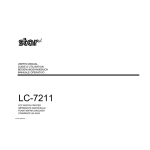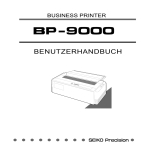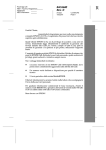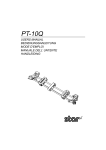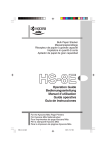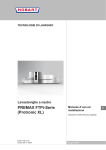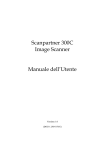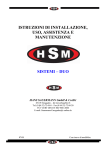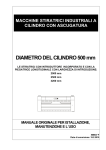Download Star Micronics SF-15HA User's Manual
Transcript
SF-15HA USER’S MANUAL BEDIENUNGSANLEITUNG MODE D’EMPLOI MANUALE UTENTE 80825730 NOTICE ● All rights reserved. Reproduction of any part of this manual in any form whatsoever without STAR’s express permission is forbidden. ● The contents of this manual are subject to change without notice. ● All efforts have been made to ensure the accuracy of the contents of this manual at the time of press. However, should any errors be detected, STAR would greatly appreciate being informed of them. ● The above notwithstanding, STAR can assume no responsibility for any errors in this manual. ANMERKUNGEN ● Alle Rechte vorbehalten. Die Wiedergabe von Teilen dieser Anleitung in jedweder Form bedarf der schriftlichen Genehmigung durch STAR. ● Inhaltliche Änderungen vorbehalten. ● Diese Bedienungsanleitung wurde vor Drucklegung mit gebührender Sorgfalt überprüft. Sollten sich dennoch Fehler eingeschlichen haben, bittet STAR um Benachrichtigung. ● STAR übernimmt keine Gewähr für Betriebsstörungen, die sich aus etwaigen Fehlern in dieser Bedienungsanleitung ergeben. REMARQUE ● Tous droits réservés. La reproduction de toute partie de ce mode d’emploi, sous quelque forme que ce soit, est strictement interdite sans l’autorisation expresse de STAR. ● Le contenu de ce mode d’emploi est sujet à modification sans préavis. ● Tous les efforts ont été faits pour assurer la précision du contenu de ce manuel au moment de l’impression. STAR serait très heureux d’être informé des erreurs qui pourraient y être découvertes. ● En dépit de la remarque ci-dessus, STAR n’assume aucune responsabilité pour les erreurs de ce manuel. AVVERTENZA ● Tutti i diritti sono riservati. La riproduzione di questo manuale, anche parziale, in qualsiasi forma e senza preventiva autorizzazione scritta della STAR, è proibita. ● La STAR si riserva il diritto di apportare modifiche in qualunque momento, senza specificarne i motivi. ● È stato fatto il possibile per assicurare l'accuratezza del contenuto di questo manuale, fino al momento della stampa. Si prega di communicare eventuali errori alla STAR. ● La STAR non si assume alcuna responsabilità per possibili errori riscontrati in questo manuale. Copyright 1995 Star Micronics Co., Ltd. TABLE OF CONTENTS SF-15HA Automatic Sheet Feeder Unpacking Preparing the printer Installing the automatic sheet feeder Loading paper Feeding a single sheet of paper Operational Precautions Cleaning Troubleshooting Specifications 1 2 2 4 6 7 7 8 9 INHALTSVERZEICHNIS Automatischer Einzelblatteinzug SF-15HA Auspacken Vorbereitung des Druckers Einbau des automatischen Einzelblatteinzugs Papier einlegen Einziehen eines Einzelblatts Vorsichtsmaßregeln zum Betrieb Reinigung Fehlersuche Technische Daten 10 11 11 13 15 16 16 17 18 TABLE DES MATIERES Introducteur automatique de feuilles SF-15HA Déballer le SF-15HA Préparer l’imprimante Installer l’introducteur automatique de feuilles Charger du papier Introduire une seule feuille de papier Précautions relatives à l’utilisation Nettoyer l’introducteur automatique de feuilles Guide de dépannage Spécifications 19 20 20 22 24 25 25 26 27 INDICE Caricatore automatico fogli singoli SF-15HA Disimballaggio Preparazione della stampante Installazione del caricatore automatico fogli singoli Caricamento della carta Inserimento di un singolo foglio di carta Precauzioni d’uso Pulizia Ricerca e soluzione dei problemi Specifiche tecniche 28 29 29 31 33 34 34 35 36 1 The SF-15HA Automatic Sheet Feeder makes it possible to automatically feed paper into your printer. This manual describes the operational procedures for using the SF-15HA. Unpacking ❏ After unpacking the contents of the carton, check to make sure you have all five items. If anything is missing, contact your dealer. Automatic sheet feeder Hopper attachment User’s Manual Note: The automatic sheet feeder is protected by packing material and tape during shipping. Be sure to remove all of the protective material and tape before use. Important! The following procedure requires you to break out two small pieces in order to expose mechanisms that the automatic sheet feeder must connect with to operates properly. Make sure that you perform this procedure exactly as described below. English English SF-15HA Automatic Sheet Feeder 2 SF-15HA Automatic Sheet Feeder Preparing the printer ❏ Enter the printer’s EDS Mode and make the setting that tells the printer that ❏ ❏ ❏ ❏ the ASF is installed (with LC-1511/1521/4511/4521 models, Bank A, Switch 4 is OFF). Refer to the User’s Manual that comes with the printer for details on using the EDS Mode. Unplug the printer from its AC power source. Open the mute cover of the printer. Push the release lever back to the cut-sheet position. Open the rear cover by pushing it back so the cover swings back and down. Rear cover Release lever Mute cover ❏ Break away the two small pieces from the rear cover as shown in the ❏ illustration above. You can do this by using a pair of electrician’s pliers or similar tool to clip the four plastic tabs that hold each of the pieces in place. If you do not have any tools available, repeatedly press down where indicated by the arrows a number of times until the tabs weaken and the pieces break free. Close the rear cover. Installing the automatic sheet feeder ❏ If you have not already done so: ✓ Make sure that the printer is unplugged from its AC power source. ✓ Open the mute cover and rear cover of the printer. ✓ Push the release lever back to the cut-sheet position. ✓ Remove the small pieces from the rear cover. ✓ Close the rear cover. See the procedure under “Preparing the printer” in the previous section for details. Installing the automatic sheet feeder 3 ❏ arms enter into grooves in the printer mechanism that was exposed when you removed the two small pieces (see “Preparing the printer” in the previous section). The top of the automatic sheet feeder angled towards the front of the printer when you do this. Swing the back of the automatic sheet down, and press down gently until it settles securely in place. ❏ Close the mute cover. ❏ Insert the three hopper attachments on top of the hopper support as shown below. Hopper attachment English English ❏ Lower the auto sheet feeder into the printer so the two round tabs on its 4 SF-15HA Automatic Sheet Feeder Loading paper ❏ Pull the paper tray cover of the automatic sheet feeder forward. ❏ Align the left paper guide with the scale mark that matches the size of the ❏ paper you are using. For any paper size other than A3 landscape (horizontal), align the left paper guide with the A4 or LTR mark. For A3 landscape paper, align the paper guide with the A3 mark. Adjust the right paper guide so there is enough space to insert the paper. Paper guides ❏ Pick up a stack of paper with both hands and fan through it with your thumb. This prevents paper from sticking together when it is fed by the automatic feeder. Note: The auto sheet feeder can hold about 50 sheets of 64g/m2 (30 sheets of 80g/m2) paper. ❏ Tap all four edges of the stack of paper on a table or desk to make sure they are smooth and even. Loading paper 5 ❏ Carefully place the paper into the paper tray against the stationary paper Paper guide Retaining clip ❏ Close the paper tray cover. ❏ Make sure that the release lever is pushed back to the cut-sheet position. You are now ready to print with the auto sheet feeder. English English guide on the right side. Make sure that the left and right edges of the paper stack are under the retaining clips inside the tray. 6 SF-15HA Automatic Sheet Feeder Feeding a single sheet of paper Use the following procedure to manually feed a single sheet of paper while the auto sheet feeder is installed. ❏ Insert the paper into the slot behind the stacker as shown below. A4 ❏ ❏ For any paper size other than A3 landscape (horizontal), align the paper with the A4 mark when you insert it. For A3 landscape paper, align the center of the paper with the center of the slot. Press the control panel’s ON LINE button to put the printer off line. Press FORM FEED button to feed the paper into the printer. Operational Precautions 7 ✓ ✓ ✓ ✓ Loading too much paper can lead to problems that damage the auto sheet feeder mechanism. Use only single-ply paper. Never use multi-part forms or label paper. Printing may become misaligned when only two or three sheets of paper are left in the hopper. To avoid this, always make sure that there is enough paper in the hopper. When replenishing paper, remove any leftover sheets, stack it with the new paper, and fan the entire stack before placing it in the hopper. Do not use any paper that is folded or wrinkled. Use new paper whenever possible. Avoid reusing paper. Remove all the paper from the hopper if you do not plan to perform any printing for a long time. Paper left in the printer for a long time can bend or become deformed. Cleaning The automatic sheet feeder is designed to provide many years of reliable operation. To ensure optimum performance, you should periodically remove the automatic sheet feeder from the printer and clean any dirt and dust that may have accumulated. Use a soft cloth dampened with alcohol to clean the platen and automatic sheet feeder roller. Note: Never use a rough cloth, thinner, or trichlene when cleaning this equipment. Doing so can result in unsightly scratches or stains. English English Operational Precautions ✓ Up to 50 sheets of paper (64 g/m2 A4-size) can be loaded in the hopper. 8 SF-15HA Automatic Sheet Feeder Troubleshooting Use the following table to help track down the causes of problems and to determine the best solution to deal with them. Problem Automatic sheet feeder does not function. Possible Cause Recommended Action Paper is not stacked properly. Load the paper correctly Platen is not operating properly. Confirm that the feeder is properly installed and that all gears are meshing correctly. Printer is not in the ASF mode. Use the EDS Mode to make the necessary settings. Paper Out detection is not performed. Use the EDS Mode to make the necessary settings. Out of paper Load more paper. Paper jam Clear paper jam. Release lever is in the forward (fanfold) position. Push release lever back to cut-sheet position. Paper Out detection is not performed. Use the EDS Mode to make the necessary settings. More than one sheet being fed. Insufficient paper fanning Fan paper and reload Wrong paper type Use only paper that meets specifications. Paper is being creased. Defective paper Use different paper. Too much lateral movement of paper Adjust the paper guide settings so the feeder roller can close on the paper. Stacker is too full. Empty the stacker Wrong paper type Use only paper that meets specifications. Paper does not feed properly. Paper does not eject properly. Specifications 9 Dimensions: (without hopper) 8.7(W)" × 3.5"(D) × 3.5"(H) 220(W) × 90(D) × 88(H) mm Weight: 1.7 lbs. / 0.8kg Paper size: B5, A4, LTR, B4, A3, Legal Paper thickness: 0.00375" to 0.00472" / 0.08 to 0.12 mm Paper weight: 16 to 24 lbs / 60 to 90 g/m2 / 52 to 77 kg (one-ply) Printing area: 4 mm (0.16") 5 mm (0.2") 5 mm (0.2") 8 mm (0.31") Hopper capacity: 50 sheets maximum (64 g/m2 A4-size paper) 30 sheets maximum (80 g/m2 A4-size paper) Stacker capacity: 10 sheets maximum (64 g/m2 A4-size paper) Temperature: Operating: 41°F to 95°F (5°C to 35°C) Non-operating: -22°F to 149°F (-30°C to 65°C) Humidity: Operating: 30% to 80% (non-condensation) Non-operating: 20% to 90% (non-condensation) English English Specifications 10 Automatischer Einzelbatteinzug SF-15HA Der automatische Einzelbatteinzug SF-15HA erlaubt es, Einzelblattpapier automatisch in Ihren Drucker einzuziehen. Diese Anleitung beschreibt den Betrieb des SF-15HA. Auspacken ❏ Nach dem Auspacken des Kartoninhalts prüfen Sie, ob alle fünf Teile vorhanden sind. Wenn ein Teil fehlt, wenden Sie sich an Ihren Fachhändler. Automatischer Automatic Einzelbatteinzug sheet feeder Hopper attachment Papierbehälterstützen Bedienungsanleitung User’s Manual Hinweis: Der automatische Einzelbatteinzug ist beim Transport durch Verpackungsmaterial und Verpackungsband geschützt. Vor der Inbetriebnahme müssen alle Verpackungsmaterialien entfernt werden. Wichtig! Das folgende Verfahren setzt voraus, daß Sie zwei kleine Teile herausbrechen, um die Mechanik freizulegen, mit der der automatische Einzelbatteinzug verbunden werden muß, um richtig zu arbeiten. Stellen Sie sicher, daß diese Arbeit genau so ausgeführt wird, wie im folgenden beschrieben. Vorbereitung des Druckers 11 Vorbereitung des Druckers ❏ Den Drucker in den EDS-Modus schalten, und die Einstellung vornehmen, Deutsch ❏ ❏ ❏ ❏ die dem Drucker mitteilt, daß der ASF installiert ist. Bei LC-1511/1521/ 4511/4521 steht Schaltergruppe A, Schalter 4 auf OFF. Einzelheiten zum EDS-Modus siehe Bedienungsanleitung des Druckers. Das Netzkabel aus der Steckdose ziehen. Die transparente Schalldämpfabdeckung des Druckers öffnen. Den Papierwahlschalter nach hinten in Einzelblattstellung stellen. Die Traktorabdeckung durch Zurückdrücken öffnen. Release lever Papierwahlschalter Rear cover Traktorabdeckung Mute cover Schalldämpfungsabdeckung ❏ Die beiden kleinen Stücke aus der Traktorabdeckung brechen, wie in der ❏ Abbildung oben gezeigt. Dazu können Sie eine Kneifzange oder ein ähnliches Werkzeug verwenden, um die vier Plastikzapfen durchzutrennen, die die beiden Stücke festhalten. Wenn kein Werkzeug zur Hand ist, drücken Sie wiederholt an der Stelle nach unten, die in der Abbildung mit einem Pfeil gekennzeichnet ist, bis die Zapfen ermüden und schließlich brechen. Die Traktorabdeckung schließen. Einbau des automatischen Einzelbatteinzugs ❏ Wenn Sie dies noch nicht getan haben, tun Sie jetzt folgendes: ✓ Sicherstellen, daß das Netzkabel aus der Steckdose gezogen ist. ✓ Die transparente Schaldämpfabdeckung und die Traktorabdeckung des Druckers öffnen. ✓ Den Papierwahlschalter in Einzelblattpapierstellung nach hinten stellen. ✓ Die beiden kleinen Stücke aus der Traktorabdeckung brechen. ✓ Die Traktorabdeckung schließen. 12 Automatischer Einzelbatteinzug SF-15HA Einzelheiten siehe “Vorbereitung des Druckers” im vorherigen Kapitel. ❏ Den automatischen Einzelbatteinzug in den Drucker absenken, so daß die ❏ beiden runden Zapfen an den Armen in die Nuten im Druckermechanismus eingreifen, der freigelegt wurde, als die beiden kleinen Stücke aus der Rückwand ausgebrochen wurden (siehe “Vorbereitung des Druckers” im vorherigen Kapitel). Die Oberseite des automatischen Einzelbatteinzugs weist dabei im Winkel zur Druckervorderseite hin. Den automatischen Einzelbatteinzug vorsichtig nach unten drücken, bis er fest einrastet. ❏ Die transparente Schalldämpfabdeckung schließen. ❏ Die drei Papierbehälterstützen oben auf den Halterungen des Papierbehälters anbringen, wie in der Abbildung gezeigt. Hopper attachment Papierbehälterstützen Papier einlegen 13 Papier einlegen ❏ Die Papierfachabdeckung des automatischen Einzelbatteinzugs nach vorne ziehen. ❏ des verwendeten Papiers entspricht. Für A3-Papier im Querformat richten Sie die Papierführung an der A3Markierung aus. Für andere Papierformate als A3 Querformat richten Sie die Papierführung an der Markierung A4 oder LTR aus. Die rechte Papierführung so einstellen, daß genug Platz zum Einsetzen des Papiers vorhanden ist. Papierführungen Paper guides ❏ Nehmen Sie einen Stapel Papier mit beiden Händen, und fächern Sie ihn mit dem Daumen gut auf. Dadurch wird verhindert, daß Papier beim Einzug in den Drucker zusammenhaftet. Hinweis: Der automatische Einzelbatteinzug kann etwa 50 Blatt Papier der Stärke 64 g/ m2 (30 Blatt mit 80 g/m2) fassen. ❏ Klopfen Sie alle vier Kanten des Papierstapels auf einem Tisch gerade, um sicherzustellen, daß der Stapel sauber und eben ist. Deutsch ❏ Die linke Papierführung an der Skalenmarkierung ausrichten, die der Größe 14 Automatischer Einzelbatteinzug SF-15HA ❏ Legen Sie das Papier an der rechten festen Papierführung ausgerichtet, vorsichtig ins Papierfach ein. Stellen Sie sicher, daß die linke und rechte Kante des Papierstapels unter den Halteclips im Papierfach ist. Paper guide Papierführung Haltclip Retaining clip ❏ Die Papierfachabdeckung schließen. ❏ Sicherstellen, daß der Papierwahlschalter in Einzelblattpapier-Stellung steht. Jetzt kann mit dem automatischen Einzelbatteinzug gedruckt werden. Einziehen eines Einzelblatts 15 Einziehen eines Einzelblatts A4 ❏ ❏ Für A3-Papier im Querformat richten Sie die Mitte des Papiers an der Mitte des Schlitzes aus. Für andere Papierformate als A3 Querformat richten Sie die Papierführung an der Markierung A4 oder LTR aus. Die Taste ON LINE am Bedienfeld drücken, um den Drucker auf Off-line Betrieb zu schalten. Die Taste FORM FEED am Bedienfeld drücken, um Papier in den Drucker einzuziehen. Deutsch Auf folgende Weise wird ein einzelnes Blatt Papier eingezogen, wenn der automatische Einzelbatteinzug installiert ist. ❏ Legen Sie das Papier in den Schlitz hinter dem Papierstapler ein, wie in der Abbildung unten gezeigt. 16 Automatischer Einzelbatteinzug SF-15HA Vorsichtsmaßregeln zum Betrieb ✓ Bis zu 50 Blatt Papier (Stärke 64 g/m2) können in den Papierbehälter ✓ ✓ ✓ ✓ eingelegt werden. Durch Einlegen von zuviel Papier kann der automatische Einzelbatteinzug-Mechanismus beschädigt werden. Immer nur einlagiges Papier verwenden. Niemals mehrlagige Vordrucke oder Etikettenpapier verwenden. Die richtige Druckausrichtung kann verloren gehen, wenn nur zwei oder drei Blatt Papier im Papierbehälter übrig sind. Um dies zu vermeiden, immer sicherstellen, daß genug Papier im Papierbehälter ist. Beim Nachfüllen von Papier das vorhandene Papier entnehmen, neues Papier aufstapeln, und dann den ganzen Stapel zusammen in den Papierbehälter einlegen. Kein gefaltetes oder zerknittertes Papier verwenden. Wenn möglich, immer neues Papier verwenden. Papier nach Möglichkeit nicht doppelt bedrucken. Immer das Papier aus dem Papierbehälter entnehmen, wenn längere Zeit nicht gedruckt werden soll. Längere Zeit im Drucker belassenes Papier kann sich vrziehen oder verformen. Reinigung Der automatische Einzelbatteinzug ist für jahrelangen störungsfreien Betrieb konstruiert. Um optimale Leistung zu garantieren, sollte er regelmäßig gereinigt werden. Dazu wird der automatische Einzelbatteinzug vom Drucker abgenommen, und Staub und Schmutz, der sich evt. angesammelt hat, wird abgewischt. Einen weichen, fusselfreien und mit Alkohol angefeuchteten Lappen nehmen, um die Druckwalze und die Zuführwalzen des automatischen Einzelbatteinzugs abzuwischen. Hinweis: Keine groben Lappen, Verdünner, Trichlen o.ä. zum Reinigen des Geräts verwenden. Dadurch können unschöne Kratzer oder Flecken hervorgerufen werden. Fehlersuche 17 Fehlersuche Problem Automatischer Einzelbatteinzug arbeitet nicht. Mögliche Ursache Abhilfemaßnahme Papier nicht richtig gestapelt. Druckwalze arbeitet nicht richtig. Papier richtig einlegen. Bestätigen, daß der automatische Einzelbatteinzug richtig eingesetzt ist und alle Räder richtig ineinandergreifen. Den EDS-Modus verwenden, um die erforderlichen Einstellungen vorzunehmen. Den EDS-Modus verwenden, um die erforderlichen Einstellungen vorzunehmen. Papier nachfüllen. Papierstau beheben. Hebel in Einzelblattstellung zurückstellen. Den EDS-Modus verwenden, um die erforderlichen Einstellungen vorzunehmen. Papier auffächern und neu einlegen. Nur Papier verwenden, das den Spezifikationen entspricht. Anderes Papier verwenden. Die Papierführung so einstellen, daß die Einzugwalzen richtig auf das Papier drücken. Den Papierstapler leeren. Nur Papier verwenden, das den Spezifikationen entspricht. Drucker ist nicht im ASFModus. Papier-Ende-Erkennung funktioniert nicht. Papier wird nicht richtig eingezogen. Papier verbraucht Papierstau Hebel steht in Endlospapierstellung. Papier-Ende-Erkennung funktioniert nicht. Mehrere Blätter werden gleichzeitig eingezogen. Papier nicht richtig durchgefächert. Papier entnehmen, durchfächern, und wieder einlegen. Defektes Papier Zu starke Querbewegung des Papiers Papier wird zerknittert. Papier wird nicht richtig ausgegeben. Der Papierstapler ist zu voll. Falscher Papiertyp Deutsch Falls Störungen auftreten, richten Sie sich zunächst nach der folgenden Fehlersuchtabelle, um die Ursache zu erkennen und wenn möglich schnell zu beheben. 18 Automatischer Einzelbatteinzug SF-15HA Technische Daten Abmessungen: (ohne Papierbehälter) 220 × 90 × 88 mm(B×T×H) Gewicht: 0,8 kg Papierformat: B5, A4, US-LTR, B4, A3, US-Legal Papierstärke: 0,08 bis 0,12 mm Papiergewicht: 60 bis 90 g/m2, 52 bis 77 kg (einlagig) Druckbereich: 4 mm (0.16") 5 mm (0.2") 5 mm (0.2") 8 mm (0.31") Papierbehälter-Kapazität: 50 Blatt maximal (64 g/m2, A4-Papier) 30 Blatt maximal (80 g/m2, A4-Papier) Staplerkapazität: 10 Blatt maximal (64 g/m2, A4-Papier) Temperatur: Betrieb: 5˚C bis 35˚C Lagerung: -30˚C bis 65˚C Luftfeuchtigkeit: Betrieb: 30% bis 80% (keine Kondensation) Lagerung: 20% bis 90% (keine Kondensation) 19 Introducteur automatique de feuilles SF-15HA L’introducteur automatique de feuilles SF-15HA vous permet de charger automatiquement du papier dans votre imprimante. Ce manuel fournit les instructions d’utilisation du SF-15HA. Déballer le SF-15HA ❏ Déballez le contenu de la caisse et vérifiez si vous avez bien tous les cinq Introducteur automatique de feuilles Automatic sheet feeder Hopper Supportattachment de magasin d’alimentation Mode Manual d’emploi User’s Remarque: L’introducteur automatique de feuilles est protégé par un emballage et du ruban adhésif pour le transport. Déballez complètement l’introducteur automatique de feuilles et décollez le ruban adhésif avant l’utilisation. Attention! Pour préparer l’imprimante, il vous faudra casser deux petites pièces en plastique afin d’exposer les mécanismes sur lesquels l’introducteur automatique de feuilles SF-15HA doit être monté pour un fonctionnement correct. Pour effectuer cette opération, suivez scrupuleusement les instructions données. Français Français éléments. Si un des éléments manque, contactez votre revendeur. 20 Introducteur automatique de feuilles SF-15HA Préparer l’imprimante ❏ Activez le mode EDS de l’imprimante et effectuez le réglage signalant à ❏ ❏ ❏ ❏ l’imprimante que l’introducteur automatique de feuilles est installé (avec les imprimantes LC-1511/1521/4511/4521, banque A, le commutateur 4 est positionné sur “OFF”). Pour plus de détails relatifs à l’utilisation du mode EDS, reportez-vous au mode d’emploi accompagnant l’imprimante. Débranchez la prise secteur de l’imprimante. Ouvrez le capot anti-bruit de l’imprimante. Poussez le levier de relâchement jusqu’à la position d’introduction de documents séparés. Pour ouvrir le capot arrière de l’imprimante, poussez ce dernier vers l’arrière afin de le faire basculer. Capot arrière Rear cover Release lever Levier de relâchement Mute cover Capot anti-bruit ❏ Cassez les deux petites pièces en plastique du capot arrière de la manière ❏ illustrée ci-dessus. Pour ce faire, vous pouvez utiliser une pince d’électricien ou un outil semblable afin de couper les quatre languettes en plastique maintenant chacune des deux petites pièces en place. Si vous ne disposez pas d’outil adéquat, appuyez à plusieurs reprises sur l’emplacement indiqué par une flèche jusqu’à ce que les languettes plient et que les pièces cassent. Fermez le capot arrière. Installer l’introducteur automatique de feuilles ❏ Si cela n’est pas déjà fait: ✓ Assurez-vous que la prise secteur de l’imprimante est débranchée. ✓ Ouvrez le capot anti-bruit et le capot arrière de l’imprimante. ✓ Poussez le levier de relâchement jusqu’à la position d’introduction de documents séparés. Installer l’introducteur automatique de feuilles 21 ✓ Cassez les deux petites pièces en plastique du capot arrière. ✓ Fermez le capot arrière. ❏ Français Français ❏ Pour plus de détails, reportez-vous aux étapes de la section précédente “Préparer l’imprimante”. Installez l’introducteur automatique de feuilles dans l’imprimante en veillant à ce que les deux languettes arrondies situées sur les bras de l’introducteur s’insèrent dans les fentes du mécanisme d’imprimante rendu accessible lors du sectionnement des deux petites pièces du capot arrière (reportez-vous à la section précédente “Préparer l’imprimante”). La partie supérieure de l’introducteur penchera vers l’avant de l’imprimante lorsque vous effectuez cette opération. Basculez le dos de l’introducteur vers l’arrière et appuyez doucement sur ce dernier jusqu’à qu’il soit correctement installé. ❏ Fermez le capot anti-bruit. ❏ Installez les trois supports de magasin d’alimentation en haut de l’introducteur aux emplacements prévus de la manière illustrée ci-dessous. Supportattachment de magasin d’alimentation Hopper 22 Introducteur automatique de feuilles SF-15HA Charger du papier ❏ Tirez vers l’avant le capot du magasin d’alimentation de l’introducteur automatique de feuilles. ❏ Alignez le guide gauche de papier sur la marque de format correspondant ❏ au format du papier que vous employez. Pour tout format de papier autre que le format A3 horizontal, alignez le guide gauche de papier sur la marque A4 ou LTR. Pour du papier A3 horizontal, alignez le guide de papier avec la marque A3. Réglez le guide droit de papier de sorte à laisser assez d’espace pour introduire le papier. Guides de guides papier Paper ❏ Prenez une pile de feuilles, tenez-la de vos deux mains et feuilletez-la du pouce. Ceci vous permettra d’éviter que plusieurs feuilles ne “collent” et soient introduites simultanément dans l’introducteur automatique de feuilles. Remarque: L’introducteur automatique de feuilles peut recevoir jusqu’à 50 feuilles de papier 64 g/m2 (30 feuilles de papier 80 g/m2). ❏ Ajustez chaque bord de la pile de feuilles sur une surface plane. Charger du papier 23 ❏ Placez soigneusement le papier dans le magasin d’alimentation contre le guide droit de papier. Assurez-vous que les bords gauche et droit de la pile de feuilles se trouvent bien sous les pinces à l’intérieur du magasin. Paper Guideguide de papier Français Français Pince clip Retaining ❏ Fermez le capot du magasin d’alimentation. ❏ Assurez-vous que le levier de relâchement se trouve bien sur la position d’introduction de documents séparés. Vous êtes maintenant prêt à imprimer à l’aide de l’introducteur automatique de feuilles. 24 Introducteur automatique de feuilles SF-15HA Introduire une seule feuille de papier Si vous souhaitez introduire manuellement une seule feuille de papier lorsque l’introducteur automatique de feuilles est installé, suivez les étapes ci-dessous. ❏ Introduisez le papier dans la fente derrière le récepteur de papier de la manière illustrée ci-dessous. A4 ❏ ❏ Pour tout format de papier autre que le format A3 horizontal, alignez le papier sur la marque A4 lorsque vous le chargez. Pour du papier A3 horizontal, alignez le centre du papier avec le centre de la fente. Appuyez sur la touche ON LINE du panneau de commande pour mettre l’imprimante hors ligne. Appuyez sur la touche FORM FEED pour faire avancer le papier dans l’imprimante. Précautions relatives à l’utilisation 25 ✓ ✓ ✓ ✓ m , format A4). Ne chargez pas trop de papier. Les problèmes créés par une surcharge de papier pourraient entraîner un endommagement du mécanisme de l’introducteur automatique de feuilles. Utilisez uniquement du papier simple exemplaire. N’utilisez jamais de formulaires multi-parties ou de feuilles d’étiquettes. L’impression pourrait être décalée lorsque le magasin d’alimentation ne contient plus que deux ou trois feuilles. Pour éviter ce problème, assurezvous toujours que le magasin d’alimentation contient assez de papier. Lorsque vous rechargez du papier, retirez toute feuille restante et introduisez-la dans la nouvelle pile de feuilles. Feuilletez toujours la pile entière de feuilles avant de la charger dans le magasin d’alimentation. N’utilisez pas de papier plié ou chiffonné. Utilisez dans la mesure du possible du papier neuf. Evitez de réutiliser le papier. Retirez le stock de papier du magasin d’alimentation si vous n’estimez pas devoir imprimer pendant une longue période. Du papier qui séjourne dans l’imprimante pendant une longue période peut plier ou se déformer. Nettoyer l’introducteur automatique de feuilles Cet introducteur automatique de feuilles est conçu pour vous garantir de nombreuses années d’utilisation fiable. Pour des performances optimales, veuillez démonter l’introducteur automatique de feuilles de l’imprimante à intervalles réguliers et nettoyer toute crasse ou poussière qui se serait accumulée sur l’appareil. Nettoyez le rouleau de l’imprimante et de l’introducteur automatique de feuilles à l’aide d’un chiffon doux imbibé d’alcool. Remarque: N’utilisez jamais de chiffon dur, de diluant ou de trichlène lorsque vous nettoyez cet équipement. Vous risqueriez de laisser des traces ou des tâches sur les éléments. Français Français Précautions relatives à l’utilisation ✓ Le2 magasin d’alimentation peut recevoir jusqu’à 50 feuilles de papier (64 g/ 26 Introducteur automatique de feuilles SF-15HA Guide de dépannage Utilisez le tableau suivant pour déterminer l’origine des problèmes et connaître le meilleur moyen de les résoudre. Problème Cause possible Marche à suivre Le papier n’est pas chargé correctement. Chargez correctement le papier. Le rouleau ne fonctionne pas correctement. Vérifiez si l’introducteur est correctement installé et si tous les mécanismes s’engrènent de manière adéquate. Le mode ASF de l’imprimante n’est pas activé. Activez le mode EDS pour effectuer les réglages nécessaires. La fonction de détection de magasin vide ne fonctionne pas. Activez le mode EDS pour effectuer les réglages nécessaires. Le magasin est vide. Chargez du papier. Bourrage de papier Retirez le bourrage de papier. Le levier de relâchement est placé en position avant (papier continu). Poussez le levier de relâchement jusqu’à la position d’introduction de documents séparés. La fonction de détection de magasin vide ne fonctionne pas. Activez le mode EDS pour effectuer les réglages nécessaires. Les feuilles “collent” ensemble. Feuilletez la pile de papier et rechargez-la. Type incorrect de papier Utilisez uniquement le papier de type recommandé. Le papier ressort de l’imprimante avec des pliures. Papier de mauvaise qualité Utilisez un autre type de papier. Mouvement latéral excessif du papier Réglez les guides de papier de sorte à ce que le rouleau de l’introducteur touche le papier. Le papier n’est pas éjecté correctement. Le récepteur de papier est saturé. Videz le récepteur de papier. Type incorrect de papier Utilisez uniquement le papier de type recommandé. L’introducteur automatique de feuilles ne fonctionne pas. L’alimentation en papier ne s’effectue pas correctement. Plus d’une feuille est introduite à la fois. Spécifications 27 Spécifications Dimensions: 220 (L) × 90 (P) × 88 (H) mm (sans magasin d’alimentation) Poids: 0,8 kg Format de papier: B5, A4, LTR, B4, A3, format légal Epaisseur du papier: 0,08 mm à 0,12 mm Poids du papier: 60 à 90 g/m2 / 52 à 77 kg (un seul exemplaire) Zone d’impression: 5 mm (0.2") 5 mm (0.2") 8 mm (0.31") Capacité du magasin d’alimentation: 50 feuilles maximum (papier A4 64 g/m2) 30 feuilles maximum (papier A4 80 g/m2) Capacité du récepteur de papier: 10 feuilles maximum (papier A4 64 g/m2) Température: Fonctionnement: 5˚C à 35˚C A l’arrêt: -30˚C à 65˚C Humidité: Fonctionnement: 30% à 80% (pas de condensation) A l’arrêt: 20% à 90% (pas de condensation) Français Français 4 mm (0.16") 28 Caricatore automatico fogli singoli SF-15HA Il caricatore automatico fogli singoli SF-15HA consente di alimentare automaticamente la carta nella stampante. Questo manuale illustra le procedure necessarie per l’utilizzo dell’unità SF-15HA. Disimballaggio ❏ Dopo aver disimballato il contenuto della confezione, accertatevi che vi siano tutti e cinque i componenti. Nel caso mancasse qualcosa, rivolgetevi al vostro rivenditore. Caricatore automatico fogli singoli Automatic sheet feeder Hopper attachment Bracci di sostegno del caricatore Manuale Utente User’s Manual Nota: Il caricatore automatico fogli singoli è protetto da materiali di imballaggio ed è avvolto da un nastro adesivo per proteggerlo dagli urti durante il trasporto. Prima di utilizzare l’alimentatore, controllate di aver tolto tutti i materiali di protezione ed il nastro adesivo. Importante! La seguente procedura prevede che vengano staccate due piccole coperture di protezione di plastica per poter esporre i meccanismi ai quali deve essere agganciato il caricatore automatico fogli singoli per funzionare in modo corretto. Accertatevi di eseguire questa operazione esattamente come illustrato di seguito. Preparazione della stampante 29 Preparazione della stampante ❏ Entrate nel modo EDS della stampante ed eseguite le impostazioni ❏ ❏ ❏ ❏ necessarie per specificare che è stato installato l’alimentatore automatico ASF (sui modelli LC1511/1521/4511/4521, il Gruppo A, Interruttore 4 va spostato su OFF). Consultate il Manuale Utente fornito con la stampante per istruzioni dettagliate sull’uso del modo EDS. Staccate la stampante dalla presa elettrica. Aprite il coperchio silenziatore della stampante. Spingete la leva di rilascio indietro sulla posizione foglio singolo. Aprite il coperchio posteriore spingendolo indietro e facendolo ribaltare verso il basso. Coperchio posteriore Rear cover Italiano Italiano Leva di rilascio Release lever Mute coversilenziatore Coperchio ❏ Staccate le due piccole coperture di protezione dal coperchio posteriore ❏ come illustrato nella figura qui sopra. Questa operazione può essere eseguita utilizzando delle pinze da elettricista o uno strumento simile per spezzare le quattro linguette di plastica che sostengono le coperture. Se non avete nessun attrezzo a portata di mano, premete ripetutamente sui punti indicati dalle frecce fino ad indebolire le linguette e a staccare le coperture di protezione. Chiudete il coperchio posteriore. Installazione del caricatore automatico fogli singoli ❏ Se non lo avete già fatto: ✓ Accertatevi che la stampante sia staccata dalla presa elettrica. ✓ Aprite il coperchio silenziatore ed il coperchio posteriore della stampante. ✓ Spingete la leva di rilascio indietro sulla posizione foglio singolo. ✓ Staccate le due piccole coperture di protezione dal coperchio posteriore. ✓ Chiudete il coperchio posteriore. 30 Caricatore automatico fogli singoli SF-15HA ❏ ❏ Per ulteriori dettagli, vedere la procedura illustrata nella sezione precedente, “Preparazione della stampante”. Abbassate il caricatore automatico fogli singoli nella stampante in modo che i due perni rotondi posti alle estremità dell’asta entrino nelle scanalature del meccanismo della stampante che è stato esposto dopo aver staccato le due piccole coperture di protezione (vedere la sezione precedente, “Preparazione della stampante”). Mentre eseguite questa operazione, la parte superiore del caricatore automatico fogli singoli dovrà essere inclinata verso il lato frontale della stampante. Ruotate verso il basso il retro del caricatore automatico fogli singoli e premetelo delicatamente finché non è ben installato in posizione. ❏ Chiudete il coperchio silenziatore. ❏ Inserite i tre bracci di sostegno sul supporto del caricatore, come illustrato qui sotto. Hopper attachment Bracci di sostegno del caricatore Caricamento della carta 31 Caricamento della carta ❏ Tirate in avanti il coperchio del vassoio carta del caricatore automatico fogli singoli. ❏ Allineate il guida carta sinistro rispetto all’indicatore di regolazione ❏ corrispondente al formato della carta che state utilizzando. Per tutti i formati carta tranne l’A3 ruotato (orizzontale), allineate il guida carta sinistro sull’indicatore A4 o LTR. Per il formato A3 ruotato, allineate il guida carta sull’indicatore A3. Regolate il guida carta destro in modo che vi sia spazio sufficiente per poter inserire la carta. ❏ Prendete una risma di carta e, tenendola con entrambe le mani, smazzatela con il pollice. In questo modo, eviterete che i fogli aderiscano l’uno all’altro mentre passano nell’alimentatore automatico. Nota: Il caricatore automatico fogli singoli può contenere circa 50 fogli di carta da 64 g/m2 (o 30 fogli da 80 g/m2). ❏ Assicuratevi che i quattro bordi della risma siano ben lisci ed uniformi battendoli leggermente contro la superficie di un tavolo o di una scrivania. Italiano Italiano Guide Paper carta guides 32 Caricatore automatico fogli singoli SF-15HA ❏ Collocate accuratamente la risma di carta nel vassoio allineandola contro il guida carta destro. Controllate che i bordi sinistro e destro della risma cadano sotto le linguette di arresto nel vassoio. Paper Guideguide carta Linguetta clip di arresto Retaining ❏ Chiudete il coperchio del vassoio carta. ❏ Verificate che la leva di rilascio sia spinta indietro sulla posizione foglio singolo. A questo punto la stampante è pronta per utilizzare il caricatore automatico fogli singoli. Inserimento di un singolo foglio di carta 33 Inserimento di un singolo foglio di carta Utilizzate la seguente procedura per inserire manualmente un singolo foglio di carta quando è installato il caricatore automatico fogli singoli. ❏ Inserite il foglio nella fessura posta dietro l’accatastatore come illustrato qui sotto. ❏ ❏ Per tutti i formati carta tranne l’A3 ruotato (orizzontale), allineate il foglio sull’indicatore A4 mentre lo inserite. Per il foglio A3 ruotato, allineate il centro del foglio rispetto al centro della fessura. Premere il tasto ON LINE del pannello di controllo per mettere la stampante OFF LINE. Premere il tasto FORM FEED per far avanzare la carta nella stampante. Italiano Italiano A4 34 Caricatore automatico fogli singoli SF-15HA Precauzioni d’uso ✓ Il caricatore può contenere fino a 50 fogli di carta (da 64 g/m2 in formato ✓ ✓ ✓ ✓ A4). Caricando un quantitativo eccessivo di carta possono verificarsi degli inconvenienti che danneggerebbero il meccanismo dell’caricatore automatico fogli singoli. Utilizzate esclusivamente carta a copia singola. Non utilizzate mai moduli multi-copia o fogli di etichette. Quando nel caricatore sono rimasti solo due o tre fogli di carta, la stampa potrebbe risultare disallineata. Per evitare questo inconveniente, verificate sempre che nel caricatore vi sia un numero sufficiente di fogli. Quando caricate la carta, togliete i fogli avanzanti, inseriteli insieme ai nuovi fogli e smazzate l’intera risma prima di collocarla nel caricatore. Non utilizzate fogli piegati o raggrinziti. Laddove possibile, cercate di utilizzate sempre della carta nuova, evitando di riutilizzare i fogli di carta. Quando non dovete stampare per un lungo periodo di tempo, togliete tutta la carta dal caricatore. La carta lasciata nel caricatore per molto tempo può incurvarsi o deformarsi. Pulizia Questo caricatore automatico fogli singoli è stato progettato per funzionare in modo affidabile per molti anni. Per garantire prestazioni ottimali, è necessario smontare periodicamente l’alimentatore automatico dalla stampante e rimuovere eventuale sporco o polvere accumulatasi. Utilizzate un panno morbido inumidito con alcool per pulire il rullo della stampante ed il rullo di trascinamento dell’alimentatore automatico. Nota: Non pulite questo dispositivo utilizzando un panno ruvido, solventi o trielina, per evitare di lasciare sgradevoli graffi o macchie. Ricerca e soluzione dei problemi 35 Ricerca e soluzione dei problemi Problema Possibile causa Operazione consigliata Il caricatore automatico fogli singoli non funziona. I fogli di carta non sono stati ben allineati l’uno sull’altro. Il rullo non sta funzionando correttamente. Caricate la carta in modo corretto. Controllate di aver installato l’alimentatore in modo esatto e che tutte le ruote dentate si ingranino correttamente. Utilizzate il modo EDS per eseguire le impostazioni necessarie. Utilizzate il modo EDS per eseguire le impostazioni necessarie. Caricate altra carta. Eliminate l’inceppamento. Spingete la leva di rilascio indietro sulla posizione foglio singolo. Utilizzate il modo EDS per eseguire le impostazioni necessarie. Smazzate la carta e ricaricatela. Utilizzate soltanto carta rispondente alle specifiche. Utilizzate della carta diversa. Regolate il guida carta in modo tale che il rullo di trascinamento dell’alimentatore riesca a bloccare la carta. Svuotare l’accatastatore. La stampante non è stata impostata per il modo ASF. La carta non avanza in modo preciso. Viene trascinato più di un foglio. La carta si sgualcisce. La carta non viene emessa in modo preciso. La funzione di rilevamento fine carta (Paper Out) non viene eseguita. La carta è terminata. La carta si è inceppata. La leva di rilascio si trova nella posizione anteriore (modulo continuo). La funzione di rilevamento fine carta (Paper Out) non viene eseguita. La risma di carta non è stata sufficientemente smazzata. Si sta utilizzando un tipo errato di carta. La carta è difettosa. La carta compie un eccessivo movimento laterale. L’accatastatore è troppo pieno. Si sta utilizzando un tipo errato di carta. Utilizzate soltanto carta rispondente alle specifiche. Italiano Italiano Consultate la seguente tabella per cercare di identificare le cause di eventuali problemi e stabilire il migliore intervento per risorverli. 36 Caricatore automatico fogli singoli SF-15HA Specifiche tecniche Dimensioni: (senza caricatore) 220 (L) × 90 (P) × 88 (A) mm Weight: 0,8 kg Formato carta: B5, A4, Letter, B4, A3, Legal Spessore carta: da 0,08 a 0,12 mm Grammatura: da 60 a 90 g/m2 / da 52 a 77 kg (copia unica) Area di stampa: 4 mm (0,16") 4 mm (0.16") mm 55mm (0,2") (0.2") 55 mm mm (0,2") (0.2") 8 mm (0,31") (0.31") Capacità caricatore: massimo 50 fogli (carta formato A4 da 64 g/m2) massimo 30 fogli (carta formato A4 da 80 g/m2) Capacità accatastatore: massimo 10 fogli (carta formato A4 da 64 g/m2) Temperatura: operativa: compresa tra 5˚C e 35˚C non operativa: compresa tra -30˚C e 65˚C Umidità: operativa: compresa tra 30% e 80% (senza condensa) non operativa: compresa tra 20% e 90% (senza condensa) Customer service information Star Micronics Technical Hotline: North America: 1-908-572-3300 United Kingdom: 44-1277-232036 Hong Kong: 852-2795-2335 Australia: 61-2-748-4300 New Zealand: 64-9-570-1470 Star Micronics FaxBack (Document Retrieval) System: Requires access to a facsimile machine or board with receive capability North America: 1-908-572-4004 Star Micronics Bulletin Board Service: Requires a computer modem North America: 1-908-572-5010 United Kingdom: 44-1494-461395 France: 33-1-305807 Germany: 49-69-780929 Netherlands: 31-73-424485 Australia and New Zealand: 61-2-748-2960 Customer response Star Micronics Co., Ltd. invites your suggestions and comments on your printer and this manual. Please address your correspondence to Attn: Product Manager Worldwide Headquarters STAR MICRONICS CO., LTD. 536 Nanatsushinya, Shimizu, Shizuoka, 424, Japan North and South America Markets STAR MICRONICS AMERICA, INC. 70- D Ethel Road West Piscataway, NJ 08854-5950 European Market STAR MICRONICS DEUTSCHLAND GMBH Westerbachstraße 59 D-60489 Frankfurt F.R. of Germany U.K. Market STAR MICRONICS U.K. LTD. Star House Peregrine Business Park Gomm Road, High Wycombe Bucks. HP13 7DL, U.K. Australian Market STAR MICRONICS PTY. LTD. Unit A/107-115 Asquith Street, Silverwater, NSW 2141 Australia New Zealand Market STAR MICRONICS (N.Z.) LTD. 64 Lunn Ave. Mount Wellington P.O. Box 6255, Wellesley St., Auckland, New Zealand. Asian Market STAR MICRONICS ASIA LTD. 18/F Tower 2, Enterprise Square 9 Sheung Yuet Road, Kowloon Bay, HONG KONG Serviceleistungen in Deutschland Im Servicefall wenden Sie sich bitte an Ihren STAR Fachhändler, hier erhalten Sie kompetente Unterstützung. Sie können sich auch direkt an unser Service Center wenden. Es bietet Ihnen folgende Leistungen: • 12 Monate kostenloser Garantieservice • Ersatzteilverkauf • Service Hotline (Fragen zur Reparaturabwicklung) Sollten Sie Ihren Drucker an das STAR Service Center (SSC) schicken, sind während der Garantiezeit lediglich die Kosten für den Transport zum SSC zu tragen. Als Garantienachweis legen Sie bitte Ihren Kaufbeleg bei. Achten Sie auf eine ausreichende Verpackung, möglichst im Originalkarton, und eine genaue Fehlerbeschreibung. Sie erreichen das SSC unter Telefon: 0531 / 8010-828 oder Telefax: 0531 / 8010-822. Für technische Fragen zur Bedienung des Druckers steht Ihnen unsere TelefonSupport-Hotline zum bundesweit einheitlichen Gebührentarif von DM 1,15 pro Minute zur Verfügung. Die Telefonnummer der Support-Hotline lautet 0190 / 51 52 54. Den kostenlosen Druckertreiber-Update-Service erreichen Sie per MODEM unter der Telefonnummer 069 / 78 09 29 (8n1).
This document in other languages
- français: Star Micronics SF-15HA
- Deutsch: Star Micronics SF-15HA
- italiano: Star Micronics SF-15HA











































